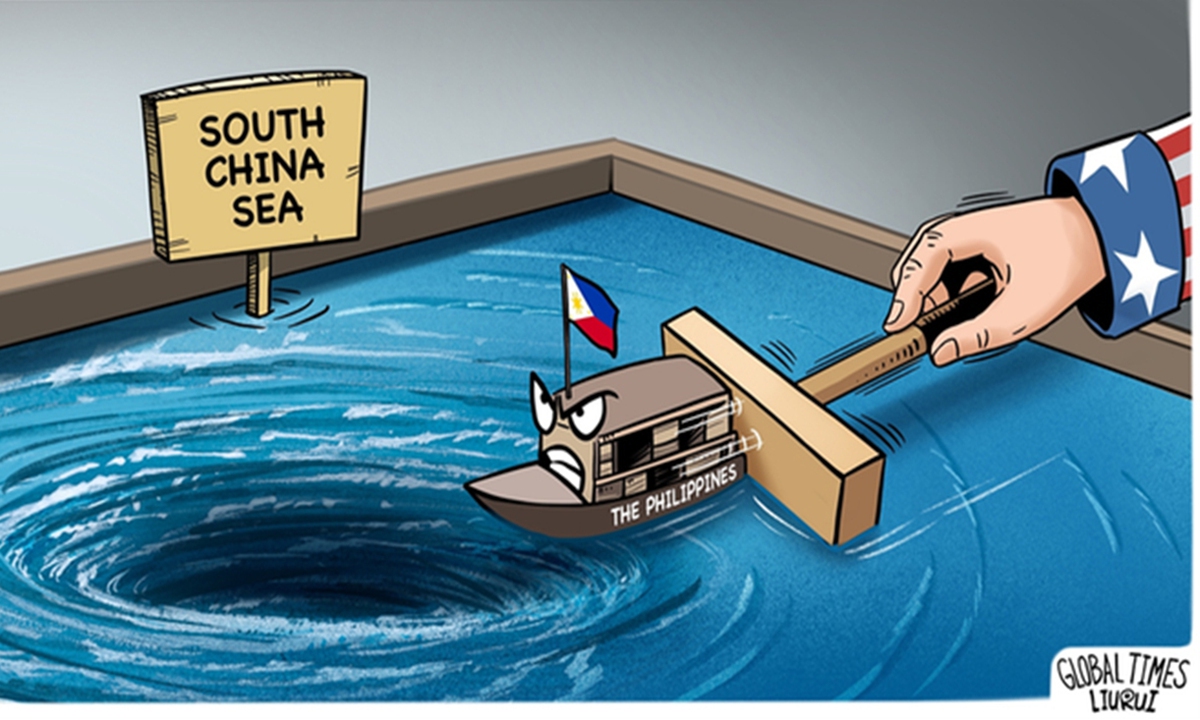
Illustration: Liu Rui/GT
Chinese Foreign Ministry said on Thursday that China is committed to peaceful development and a national defense policy that is defensive in nature, and China does not pose a threat to any country, after a prominent Philippine senator claimed that "China had set up 25 targets around the Philippine archipelago that it would attack with hypersonic missiles."
"I'm not sure what the Philippine side's source was," Mao Ning, spokesperson of the ministry, told a press conference.
However, we will certainly not sit by and watch when our legitimate rights and interests and regional peace and stability are being violated or under threat, Mao noted.
We urge relevant country to listen to the concerns its people have and the call from other countries in the region, bear in mind the fundamental interests of its own people, stay independent, good-neighborliness and friendship, earnestly respect other countries' security concerns, and act to keep the region peaceful and stable, Mao said.
Senator Imee Marcos, the sister of Philippine President Ferdinand Marcos Jr. and head of the Senate Foreign Relations Committee, made the claim in a video.
China had set 25 targets around the Philippine archipelago that it would attack with hypersonic missiles, and the northern islands of Batanes, close to China's Taiwan island, would be among the first targets, Marcos claimed, according to Reuters.
Some Chinese military experts said her claims cannot be confirmed, and are also highly unlikely.
However, some experts agreed with one point - the Philippines could play a role in helping the US threaten China's security. Reuters said Marcos opposes some of her brother's policies regarding China, including his decision to grant the US expanded access to Philippine military facilities it can use.
Some Philippine military and high-ranking officials have repeatedly mentioned that these bases could be used in the event of armed conflict in the Taiwan Straits or the South China Sea, experts said.
If these bases in the Philippines were used by the US to launch attacks against China, under such a scenario, these bases in the Philippines would be legitimate targets for Chinese strikes, Zhang Junshe, a Chinese military expert, told the Global Times on Thursday.
Marcos Jr.'s sister has repeatedly opposed the Marcos Jr. government's reliance on the US and its provocations against China over the South China Sea issue, Zhang said.
"She believes that the Philippines should not become a pawn in the US' strategy to contain China. If the Philippines continues on this path, it will eventually be abandoned by the US," the expert said.
Despite China and the Philippines agreed on a need to restore trust and create conditions for productive dialogue on the South China Sea issue during the latest round of crucial consultations, the Philippine military demanded that China compensate it for "damage" in the recent clash on June 17, calling on China to return seized firearms.
"I demanded the return of seven firearms," General Romeo Brawner was quoted as saying in a separate Reuters report on Thursday, following the order from Marcos Jr. to defuse tensions in the South China Sea.
"We are demanding that China pay 60 million pesos (about $1 million) for the damage they caused," the Philippine military official said.
The Philippine vessels were carrying out an illegal "resupply mission" which violated China's territorial waters and staging a provocation when stopped by China Coast Guard, who acted lawfully and rightfully to defend China's sovereignty. The Philippine side should face the consequences of its own action, Mao said.
As to whether the continuous provocative actions by the Philippines are aimed at pressuring the US to lower the threshold of invoking mutual defense treaty, some experts said Washington continues to hold a cautious attitude.
"While the US supports the Philippines' continuous provocations against China in the South China Sea, it does not want major incidents to occur. In other words, the US wants some level of turmoil in the region, but it wants the situation to be controllable in terms of its destructiveness and intensity," said Ding Duo, deputy director of the Institute of Maritime Law and Policy at the National Institute for South China Sea Studies.
If a major conflict occurs, the US is currently not able to intervene extensively. Therefore, it is unlikely that the US would ultimately stand up for the Philippines in the maritime dispute, Ding told the Global Times.
"I think the applicability of the Mutual Defense Treaty between the US and the Philippines in the South China Sea remains uncertain," Chen Xiangmiao, director of the World Navy Research Center at the National Institute for South China Sea Studies, told the Global Times.
While the US has made political commitments and the Philippines is enthusiastic about them, whether these commitments can be fulfilled depends on further coordination between the two sides and the development of maritime emergencies, Chen said, noting that the US has set many preconditions and scenarios, and is particularly cautious about scenarios involving direct military conflict with China.



